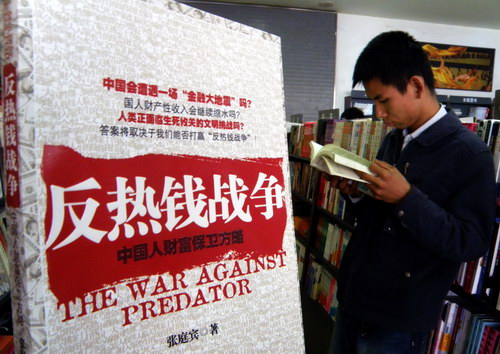Money
Easing of hot money 'unlikely'
By Wang Bo and Lan Lan (China Daily)
Updated: 2010-10-29 09:32
 |
Large Medium Small |
Authorities step up crackdown on illegal cross-border capital flows
BEIJING - China's foreign exchange regulator has vowed to crack down on illegal cross-border capital flows, but analysts said the pressure from the influx of speculative money is unlikely to ease.
 |
|
A customer reads a best-seller, The War Against Predator, in a Xinhua Bookstore in Yichang, Hubei province. China has become one of the most attractive destinations for speculative money. [Photo / China Daily] |
"By the end of October, we uncovered 197 fraudulent foreign-exchange transactions worth $7.34 billion in a nine-month crackdown on 'hot money' inflows," the State Administration of Foreign Exchange (SAFE) said on its website on Thursday.
The irregularities will create opportunities for the influx of speculative money, which affects China's balance of international payments and financial stability, SAFE said. The regulator has already penalized a number of bank outlets involved in irregular foreign exchange dealings.
Driven by the loose monetary policy in the United States, speculative capital is flowing to emerging-market economies for better returns.
China has also become one of the most attractive destinations because investors are betting on a further yuan appreciation and more interest rate hikes, analysts said.
The country's foreign exchange reserves rose $194 billion in the third quarter, far exceeding the $66 billion trade surplus and $23 billion foreign direct investment made during the same period. Part of the difference could be speculative capital flowing into the country, analysts said.
As a sign of foreign speculative investors' enthusiasm for China, the country's underground banks, which can aid the undetected transfer of foreign capital into the country, have become very active in recent months.
"I see a big jump in underground banks' business volume and speed of capital transaction in October from that of September," said Li Youhuan, economist at the Guangdong Provincial Academy of Social Sciences, who overseas a research team on "hot money".
"The total amount of money that has been brought into China in the past three months could be the largest since 2002," said Li Youhuan, who has been tracking the operations of more than 100 underground banks nationwide for years.
The massive speculative capital is likely to push up the price of a slew of agricultural products, such as soybeans, sugar, cotton and garlic, and might lead to stock market bubbles, Li Youhuan said.
China's stock market made a strong rally this month, rebounding 25 percent from its July low, which analysts said was largely driven by a strong liquidity wave caused partially by the easing monetary policy of Western central banks.
| ||||
It is essential to continue with the cooling policies and prevent the property market from rebounding in the short term, Qu said.
"There are signs that speculative capital is retreating from the property sector due to unswerving government tightening measures on the property market," Li Youhuan said.
But Standard Chartered Bank economist Li Wei said that, judging from the foreign exchange figures, the current scale of "hot money" inflows is still far less than the amounts in 2007 and 2008.
"The risk is still manageable, as most of the net money inflows in the third quarter can offset the total amount flowing out of China three months ago," he said.



